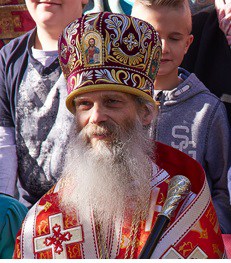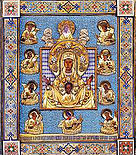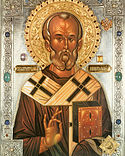Bishop Andrei of Yarraville and Australia’s reply to Vladimir Moss

A Response to V. Moss
In his article “The Reunification Of The Russian Church” (Воссоединение Русской Церкви) http://nftu.net/reply-of-v-moss-to-the-proposals-of-bishop-andrei-erastov/#comment-2728, church historian Vladimir Moss provides a critical analysis of the report that I prepared for the VI All-Diaspora Council in January 2017. More precisely, V. Moss examines only the final, closing section, in which I discussed the present canonical status of the Russian Church. I must say, it is important to me that a well-known church commentator took notice of my work and even wrote a critical analysis of it. But unfortunately, I found nothing in V. Moss’ article to embrace nor to accept as a correction. It would seem that V. Moss did not read the report carefully enough, because when analyzing the paragraphs in question, he did not consider them within the overall context of the report and did not attempt to understand the ideas and intentions of the author.
As a result, in his critical analysis he refutes ideas that he ascribes to me, but which I did not have in mind at all. It is thus not surprising that he finds contradictions and inconsistent thinking in my report.
To demonstrate V. Moss’ critical methodology one example will suffice. He cites this paragraph from my report:
“The ‘splinters’ dispute with each other over who has the right of succession from the pre-schism Church Abroad. However, it no longer exists. As was said before, the ROCOR Synod existed, not on the basis of any canonical acts, but in spite of them. The meaning of the existence of the Synod lay in the fact that it was the bearer of Church truth. But when the Synod later fell into the deception of Sergianism, it lost all significance. The canonical basis of the Synod lay in its lofty spiritual-moral authority and in considerations of what is profitable for the Church. (‘What is useful for the Church is canonical’ (V.V. Bolotov).)
And then makes the following comment:
“This again makes no sense. However great the authority of V.V. Bolotov, the expression “What is useful for the Church is canonical” is not sanctioned by Church tradition. For who is to say what is useful for the Church? Many ecumenists have considered following the canons about, for example, concelebration with heretics, to be not useful for the Church. Are they to be allowed to redefine what is not canonical as canonical simply because it is “useful” to them?! “
V. Moss makes no attempt to understand the point I was making. He dislikes V.V. Bolotov’s statement, so he interprets Bolotov arbitrarily and then objects to his own interpretation.
In fact, V.V. Bolotov does not argue at all that anyone, utilizing one’s own judgement, can declare something canonical if it benefits him. Bolotov’s point is that the Church, as a living organism inspired by the Holy Spirit, and reacting to historical circumstances, organically develops one or another canonical forms. For the most part, the Holy Fathers at the councils did not introduce new canonical formulations, but rather only strengthened those that had already arisen earlier in the Church. In this way canonicity has at its core what benefits the Church. The Church itself develops canonical forms that are most responsive to the Church’s needs and these formulations in turn, are confirmed by the canons. Met. Anthony’s Synod was not sanctioned by the Higher Church Authority of the Russian Church and did not have a formal canonical right for its existence, yet the point of benefiting the Church at that moment in history called for a centralized religious body in the diaspora and therefore its existence was justified canonically.
When reading V. Moss’ article, the impression is created that the critical analysis of my report is only a prologue to this:
V. Moss proposes that we accept three postulates of zealotry, which in his opinion must form the basis of a unified profession of faith by the reunited Russian Church. In one of these postulates, V. Moss demands that we anathematize Cyprianism and consider the consecrations of our bishops (including my own) to be invalid as they were performed with the participation of bishops of the synod of Met. Cyprian. In this way, V. Moss hopes to separate the “wolves from the sheep.”
What can I say to such a proposal?
Armchair theologians refuse to see that Met. Cyprian’s theory was a stillborn teaching that did not outlive its creator and that has no influence on the life of the Church.
After the union of the Synod of Resistance with the Synod of Abp. Kallinikos, no one remains who spreads the teachings of Met. Cyprian and there is absolutely no one interested in these teachings. Yet, this does not deter warriors against Cyprianism who have devoted their time and energy to exposing this dangerous heresy. Verbally and in print, they continue to denounce Cyprianism.
One can make another surprising observation: the denouncers of Cyprianism, as a rule, understand this teaching in great detail, while those whom they call “cyprianites,” on the contrary, have only a vague, if any, understanding of it at all. Try to find anyone among the ROCA clergy who is well versed in Met. Cyprian’s teachings. I fear this is no easy task. Enter any of our parishes and ask the first person you meet, what do you know about Cyprianism? Most likely, that person will stare at you in surprise. But, even if you were to find someone who has heard of Met. Cyprian’s teachings, that person, most likely, heard about them from one of those battling against Cyprianism!
I would like to give those battling Cyprianism the following advice: if you are truly sincere in your desire to erase Cyprianism from the face of the Earth, it is not hard to do. Simply, stop talking about Cyprianism and it will disappear of its own accord as it is of no interest to anyone but yourselves.
It is not Cyprianism, but false zealotry that is the primary danger for our Church. The Pharisaical spirit of false zealotry is foreign to the spirit of the Gospel. Like some lethal gas, it spreads among our churches and poisons the souls of the faithful. Fr. Seraphim Rose called this spiritual condition “super-correctness,” and he himself regretted that in his early works, he did his part in the creation of this “monster.” The “monster” of false zealotry is quite alive because it feeds on the human weaknesses of pride and vanity. False zealotry presumes to know the answers to all questions and, without the slightest hesitation, traces the borders of the Church as if with a ruler and pencil.
It is important to note that between false zealotry and its antipode, Cyprianism, there is one point in common, their rationality. Either teaching, in essence, represents a logical scheme. Zealots typically find fault in the Church Abroad for its inconsistent and illogical position in regard to World Orthodoxy. They do not see that they are exposing themselves, because the Church is governed by the Holy Spirit, and not by human logic. In this way, the zealots show that their ecclesiology is a product of human logic, and not the wisdom of the Church. And this is the basis upon which V. Moss hopes to build unity among churches!
How to understand this quixotic phenomenon, the never-ending battle with the non-existent heresy of Cyprianism? Is it tilting at windmills or is there some rational reason behind it?
To find the answer, let us set theology aside and return to the sinful earth. Let us ask the classic question that helps explain most matters: whom does it benefit?
Who benefits by calling our bishops “cyprianites” and denying the validity of their ordinations? Who benefits by sowing discord to undermine our union with Bp. Stefan? Who finds no joy in our union and is instead very troubled by it?
Let the reader himself find the answers to these questions.
“I urge you, brothers and sisters, to watch out for those who cause dissensions and obstacles … for such people are not serving our Lord Jesus Christ, but their own appetites. By smooth talk and flattery they deceive the hearts of the simple.” (Romans 16:17-18)
Bp. Andrei

